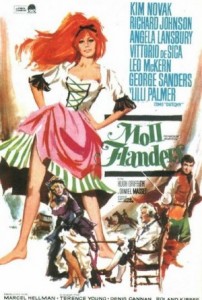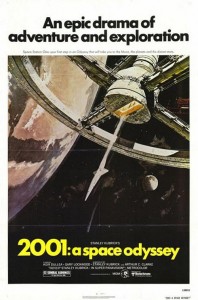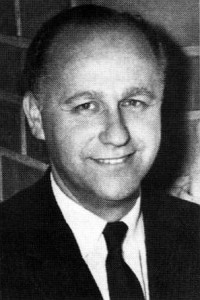“Sometimes you work on a picture that’s worth doing, most of the time you don’t. . . . All too often, the music is too good for the film. The frequency with which this happens is more an indictment of films than a compliment to composers.”—— film composer David Raksin (1912-2004)
Classical music has been around in the movies since the silent days, whether pianists improvised on the spot to the screen above their heads or, on rare occasions, a symphony orchestra performed for the big showing. There were, of course, composers at the time who wrote new music for the silent screen. But Tchaikovsky, Liszt and Mendelssohn, especially it seems, perhaps because their music is often programmatic and always romantic, were particularly suitable for train robberies and damsels in distress—maybe in the same film, if those movie-goers of old were lucky!
No, the intent of what is to come is not an exploration of the phenomenon of the willy-nilly use of classical music as background music, a sad practice that continues, whether out of arrogant plagiarism or the laziness and frugality of movie makers. Some of today’s most successful film composers are often guilty of borrowing from the classics without acknowledgment; most movie-goers, even avid film score fans unfamiliar with the classical repertoire, are unaware of the plagiarisms.
Far more interesting is seeing how well, or ineptly, classical music is used, first, in period films where parallel period music is used as a score in a deliberate effort to lend atmosphere and authenticity to the screen story. And, second, and perhaps more interesting, there are other films where classical music is an essential ingredient in the plot, the story, for example, of a composer or artist, with much source music.
Already, technically, I’m in untenable waters, for “classical” is as inaccurate a term as “serious” when referring to . . . well, “highbrow” music. There, I’ve said it: now everybody knows the music of reference, that field of music which appeals, sadly, to maybe five per cent of the general population. “Classical” refers only to a period of music from, roughly, 1750 to 1830, from the death of Johann Sebastian Bach to Hector Berlioz’ revolutionary Symphonie Fantastique, while, in reality, that same highbrow genre exists from the sixteenth century, or before, to the present, from Palestrina to Penderecki. That other incorrect term, “serious,” is vaguely broad and can apply to any music which has devotional, emotional, even esthetic meaning and value. Too, the label “serious” often causes ire in any number of non-classical artists who regard themselves as “serious” as any highbrow composer.
Have I thoroughly confused and misled? Possibly.
If I were, for example, to indulge motion pictures, past and current, which employ classical music as “film scores”—I’ll stick with the term “classical” for the duration—such a list would be endless. To provide examples, along with their famous music signatures, there are those two modern war films, Platoon (Barber’s Adagio for Strings) and Apocalypse Now (Wagner’s “Ride of the Valkyries”). And speaking of Wagner, the medieval epic Excalibur uses clips from the Ring cycle, with also a little of Carl Orff’s Carmina Burana, highly appropriate in their context, especially the Wagner.
Films with present-day settings that borrow classical music are everywhere. Just two examples. First, the bicycle movie of all bicycle movies, Breaking Away uses part of Mendelssohn’s “Italian” Symphony as a main theme and as “road” music. Babe, the story of a pig and its barnyard friends, is coddled by Saint-Saëns’ “Organ” Symphony, with a bit of Bizet and Delibes thrown in for good measure, though the possible gold mine of the Carnival of the Animals—more Saint-Saëns—is strangely left unexcavated.
 As for historical films, two quite divergent ones come to mind. Moll Flanders is, logically enough, supported by eighteenth-century music but the arranger—he can’t be called a “composer”—missteps with some nineteenth-century Offenbach, and Elizabeth lifts bits of Mozart and Elgar, both much, much too late to even remotely fit into the sixteenth century.
As for historical films, two quite divergent ones come to mind. Moll Flanders is, logically enough, supported by eighteenth-century music but the arranger—he can’t be called a “composer”—missteps with some nineteenth-century Offenbach, and Elizabeth lifts bits of Mozart and Elgar, both much, much too late to even remotely fit into the sixteenth century.
In other films set around the period of Moll Flanders, the seventeenth and eighteenth centuries of full-bottomed wigs and beauty spots, such as Dangerous Liaisons and Restoration, music was borrowed directly from Vivaldi, J. S. Bach, Handel and Gluck, sometimes used as source music. David Raksin, however, turned his score for Forever Amber into a high class pastiche—“in the flavor of,” reflecting his intelligent and creative mind. “Some people,” he wrote, “have said [the score] sounds rather satirical . . . I can only point out that the music of the court of Charles II was greatly influenced by the French. I aimed for a kind of mock-Lully, mock-Scarlatti sound, but again, a loving kind of mocking.”
The subject of historical films and the use of period music can open up some rather confusing cans of worms. Take Stanley Kubrick’s Barry Lyndon. The mid-eighteenth century setting is saturated with legitimate contemporary music by Handel, Bach and—a bit of a stretch—Mozart, but late works by Schubert and Paisiello anachronistically come from the early nineteenth century, by which time knee breeches had been replaced by trousers and wigs had all but disappeared outside of jurisprudence.
 Kubrick’s nonchalant regard for music is reflected earlier in his 2001: A Space Odyssey. The secretive and demanding director curtly dropped Alex North’s original score (later recorded on disc by Jerry Goldsmith) in favor of ready-made works by Khatchaturian, Ligeti and Johann, Jr. and Richard Strauss. The two Strausses (no relation) helped make the film famous—with Johann’s On the Beautiful Blue Danube backing the now iconic space station floating in the blackness of the cosmos, and Richard’s Also Sprach Zarathustra introductory fanfare releasing the proverbial floodgates for use in commercials.
Kubrick’s nonchalant regard for music is reflected earlier in his 2001: A Space Odyssey. The secretive and demanding director curtly dropped Alex North’s original score (later recorded on disc by Jerry Goldsmith) in favor of ready-made works by Khatchaturian, Ligeti and Johann, Jr. and Richard Strauss. The two Strausses (no relation) helped make the film famous—with Johann’s On the Beautiful Blue Danube backing the now iconic space station floating in the blackness of the cosmos, and Richard’s Also Sprach Zarathustra introductory fanfare releasing the proverbial floodgates for use in commercials.
